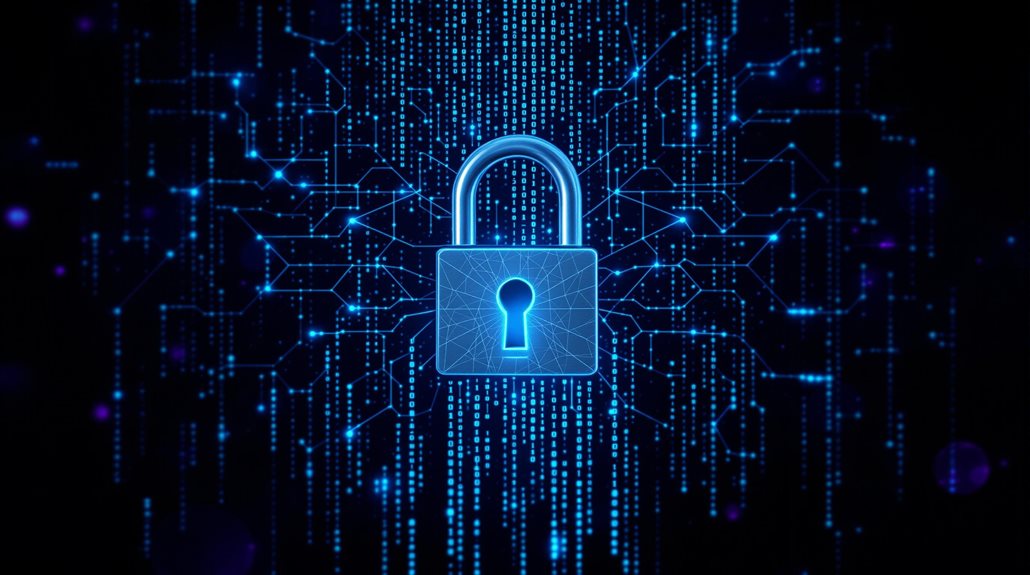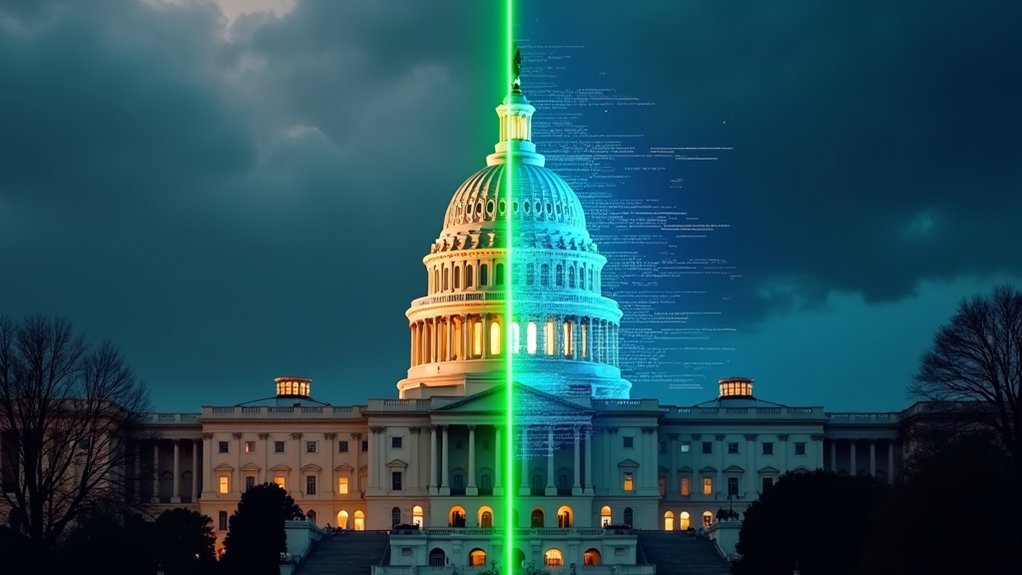Cryptography is the art and science of keeping information secure by converting normal text into scrambled code that only authorized people can understand. It’s like creating and solving secret puzzles to protect sensitive data. Modern cryptography uses complex mathematical formulas and special keys for encryption and decryption. Today, it safeguards everything from online shopping to military communications and powers technologies like Bitcoin. There’s much more to discover about this fascinating field of digital security.
Quick Overview
- Cryptography is the science of securing information by converting readable messages into coded form to protect privacy and authenticity.
- It uses mathematical algorithms and keys to encrypt data, making it unreadable to unauthorized parties who don’t have the decryption key.
- There are two main types: symmetric cryptography using one shared key, and asymmetric cryptography using public-private key pairs.
- Modern cryptography enables secure online transactions, protects cloud storage, and powers secure messaging applications.
- It originated from ancient military communications but has evolved to become essential for digital security and privacy today.

Cryptography is the art and science of keeping secrets safe by turning readable messages into scrambled code that only intended recipients can understand. The word comes from Greek, combining “kryptos” meaning hidden and “graphein” meaning to write. It’s a significant technology that guarantees data stays private, untampered, and authentic while preventing people from denying they sent a message.
There are several main types of cryptography in use today. Symmetric-key cryptography uses the same key for both encrypting and decrypting messages, like a single password that both sender and receiver know. Asymmetric-key cryptography, also called public-key cryptography, uses two different keys – one public and one private. Hash functions work differently by creating a unique fingerprint of data that can’t be reversed. Digital signatures help prove who sent a message and that it hasn’t been changed. The newest type, quantum cryptography, uses the principles of quantum physics to create ultra-secure communications.
The process works through encryption, which converts normal text (called plaintext) into scrambled code (called ciphertext), and decryption, which converts it back. This happens using special mathematical formulas called cryptographic algorithms or ciphers. Keys are fundamental pieces of secret information that make these processes work. One of the earliest known encryption methods was the Caesar cipher, used for military communications. Meanwhile, cryptanalysis is the field that studies how to break these security systems. The practice of encoding messages dates back to ancient Egyptian hieroglyphics.
Cryptography isn’t just some abstract concept – it’s everywhere in our digital world. When you shop online, your payment information is protected by cryptography. When you store files in the cloud or send a message on a secure app, cryptography keeps your data safe from prying eyes. It’s crucial for military and government communications, where keeping secrets can be a matter of national security. It’s also the technology that makes cryptocurrencies and blockchain possible. End-to-end encryption has become a standard feature in many modern messaging applications. The Satoshi Nakamoto creation of Bitcoin in 2008 demonstrated how cryptography could revolutionize digital currency by enabling secure, decentralized transactions.
In today’s connected world, cryptography has become more important than ever. It’s the invisible guardian that protects our digital lives, from simple text messages to complex financial transactions. As cyber threats continue to evolve, cryptography keeps adapting to provide new ways to protect information.
Whether it’s keeping your personal messages private or securing a company’s sensitive data, cryptography plays a significant role in maintaining security and trust in our digital age.
Frequently Asked Questions
Can Quantum Computers Break All Current Cryptographic Systems?
Quantum computers can’t break all cryptographic systems equally.
They’re mainly a threat to public key encryption like RSA and ECC. Using Shor’s algorithm, quantum computers could crack these systems relatively quickly.
However, symmetric encryption methods like AES are more resistant to quantum attacks. While quantum computers might speed up attacks on symmetric encryption, doubling the key size helps maintain security.
Scientists are developing new quantum-resistant encryption methods.
How Long Does It Take to Become a Professional Cryptographer?
Becoming a professional cryptographer takes around 6-8 years of formal education and training.
It starts with a 4-year bachelor’s degree in computer science or mathematics. Many employers prefer candidates with a master’s degree, which adds 2-3 more years.
After education, it typically takes 3-5 years of work experience to become established in the field.
Some cryptographers also pursue a Ph.D., which can add another 3-5 years.
What Programming Languages Are Essential for Learning Cryptography?
Python is typically the first choice for learning cryptography due to its easy-to-read syntax and extensive crypto libraries.
Java and C++ are also important, offering strong security features and high performance. Many cryptographers use multiple languages, but Python, Java, and C++ form the core trio.
Rust is gaining popularity for its memory safety, while JavaScript is becoming crucial for web-based cryptographic applications.
Are There Any Free Tools to Practice Cryptography for Beginners?
There are plenty of free tools for beginners to practice cryptography.
CryptoHack offers interactive puzzles and challenges that help learn the basics.
Khan Academy has a complete cryptography playlist with step-by-step lessons.
For hands-on practice, dCode.fr and Cryptii provide simple cipher encoders and decoders.
CryptoClub.org makes learning fun through games, while Coursera’s free Cryptography I class offers structured learning from Stanford professor Dan Boneh.
Which Industries Have the Highest Demand for Cryptography Experts?
Finance and banking lead the way in hiring cryptography experts to protect financial transactions and customer data.
Government and defense agencies are also major employers, especially for securing classified information.
Healthcare’s growing digital presence means there’s high demand for experts to protect patient records.
Tech companies, particularly those working in cloud computing and cybersecurity, constantly seek cryptography specialists.
These industries offer competitive salaries due to the critical nature of data protection.





